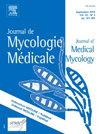伊拉克真菌病发病率和流行率--初步估计。
IF 1.8
4区 医学
Q3 MYCOLOGY
引用次数: 0
摘要
背景:伊拉克尚未对严重的表皮真菌感染进行监测。有关其发病率和流行率的信息十分有限:本研究旨在分析、计算和估计真菌感染的发病率和负担,因为以前没有这方面的数据,也没有在伊拉克进行过研究:本研究收集和审查的数据来自国内和国际已发表的真菌感染流行病学数据、未发表的研究生硕士和博士论文、医院记录和私人诊所记录。对于缺乏足够本地数据的疾病,我们还使用了其他国家的外部数据来源:我们估计每年有 985 628 例严重感染病例,占总人口的 2.26%。如果将皮肤浅表真菌感染包括在内,感染人数将增至 2,075,113 人,占总人口的 4.76%。最常见的严重感染和皮肤感染是复发性念珠菌阴道炎、真菌性鼻炎和头癣,分别占感染总数的 61.5%、21.8% 和 22.4%,尽管浅表真菌感染的总发病率也高达 1,071,485 例。呼吸道真菌病也很常见,占感染总数的 14.0%。我们预测每 100,000 人每年的负担如下:口腔念珠菌病为 247.9 人,食道念珠菌病为 6.04 人,念珠菌血症为 5.0 人,念珠菌腹膜炎为 0.75 人,复发性念珠菌阴道炎为 5461 人,过敏性支气管肺曲霉菌病为 35 人,伴有真菌过敏的严重哮喘为 46 人,侵袭性曲霉菌病为 7.9,慢性肺曲霉菌病(11.7),慢性真菌性鼻炎(496),粘孢子菌病(0.99),真菌性角膜炎(14.0),总的皮癣病(1631),其中最严重的是头癣(366)。其中许多估计值是根据其他国家的数据得出的,因此需要更多来自伊拉克的数据来验证或修改这些估计值:结论:复发性念珠菌阴道炎、真菌性鼻炎和头癣被认为是伊拉克最常见的真菌疾病。本文章由计算机程序翻译,如有差异,请以英文原文为准。
Fungal disease incidence and prevalence in Iraq – Preliminary estimates
Background
The surveillance of serious and superficial skin fungal infections in Iraq has not been conducted. Limited information exists on their incidence and prevalence.
Objectives
This study aimed to analyze, compute and estimate the prevalence and burden of fungal infections, as no previous data is available and no studies has been attempted in Iraq.
Methods
In the present study the data were collected and reviewed from published data on epidemiology of fungal infections nationally, internationally, from unpublished postgraduate master and PhD theses, hospital records and private clinic records. External sources of data from other countries were used for diseases which lacked sufficient local data.
Results
We estimated 985,628 annual serious infections comprising of 2.26 % of the total population. When including superficial fungal infections group of the skin, this rises to 2,075,113 infections at 4.76 % of the total population. The most common serious and skin infections were recurrent Candida vaginitis, fungal rhinosinusitis and tinea capitis comprising 61.5 %, 21.8 %, and 22.4 % of all infections although the total incidence of superficial fungal infections was also high at 1,071,485. Respiratory fungal disease is also common comprising 14.0 % of infections. We predicted the following annual burden per 100,000; oral candidiasis at 247.9, esophageal candidiasis at 6.04, candidemia at 5.0, Candida peritonitis at 0.75, recurrent Candida vaginitis at 5461, allergic bronchopulmonary aspergillosis at 35, severe asthma with fungal sensitisation at 46, invasive aspergillosis at 7.9, chronic pulmonary aspergillosis at 11.7, chronic fungal rhinosinusitis at 496, mucormycosis at 0.99, fungal keratitis at 14.0, and total dermatophytosis at 1631, the most severe being tinea capitis at 366. Many of these estimates were made with data sourced from other nations, so additional data from Iraq is required to validate or modify these estimates.
Conclusion
Recurrent Candida vaginitis, fungal rhinosinusitis, and tinea capitis are considered to be the most frequent fungal diseases present in Iraq.
求助全文
通过发布文献求助,成功后即可免费获取论文全文。
去求助
来源期刊
CiteScore
5.10
自引率
2.80%
发文量
68
审稿时长
6-12 weeks
期刊介绍:
The Journal de Mycologie Medicale / Journal of Medical Mycology (JMM) publishes in English works dealing with human and animal mycology. The subjects treated are focused in particular on clinical, diagnostic, epidemiological, immunological, medical, pathological, preventive or therapeutic aspects of mycoses. Also covered are basic aspects linked primarily with morphology (electronic and photonic microscopy), physiology, biochemistry, cellular and molecular biology, immunochemistry, genetics, taxonomy or phylogeny of pathogenic or opportunistic fungi and actinomycetes in humans or animals. Studies of natural products showing inhibitory activity against pathogenic fungi cannot be considered without chemical characterization and identification of the compounds responsible for the inhibitory activity.
JMM publishes (guest) editorials, original articles, reviews (and minireviews), case reports, technical notes, letters to the editor and information. Only clinical cases with real originality (new species, new clinical present action, new geographical localization, etc.), and fully documented (identification methods, results, etc.), will be considered.
Under no circumstances does the journal guarantee publication before the editorial board makes its final decision.
The journal is indexed in the main international databases and is accessible worldwide through the ScienceDirect and ClinicalKey platforms.

 求助内容:
求助内容: 应助结果提醒方式:
应助结果提醒方式:


